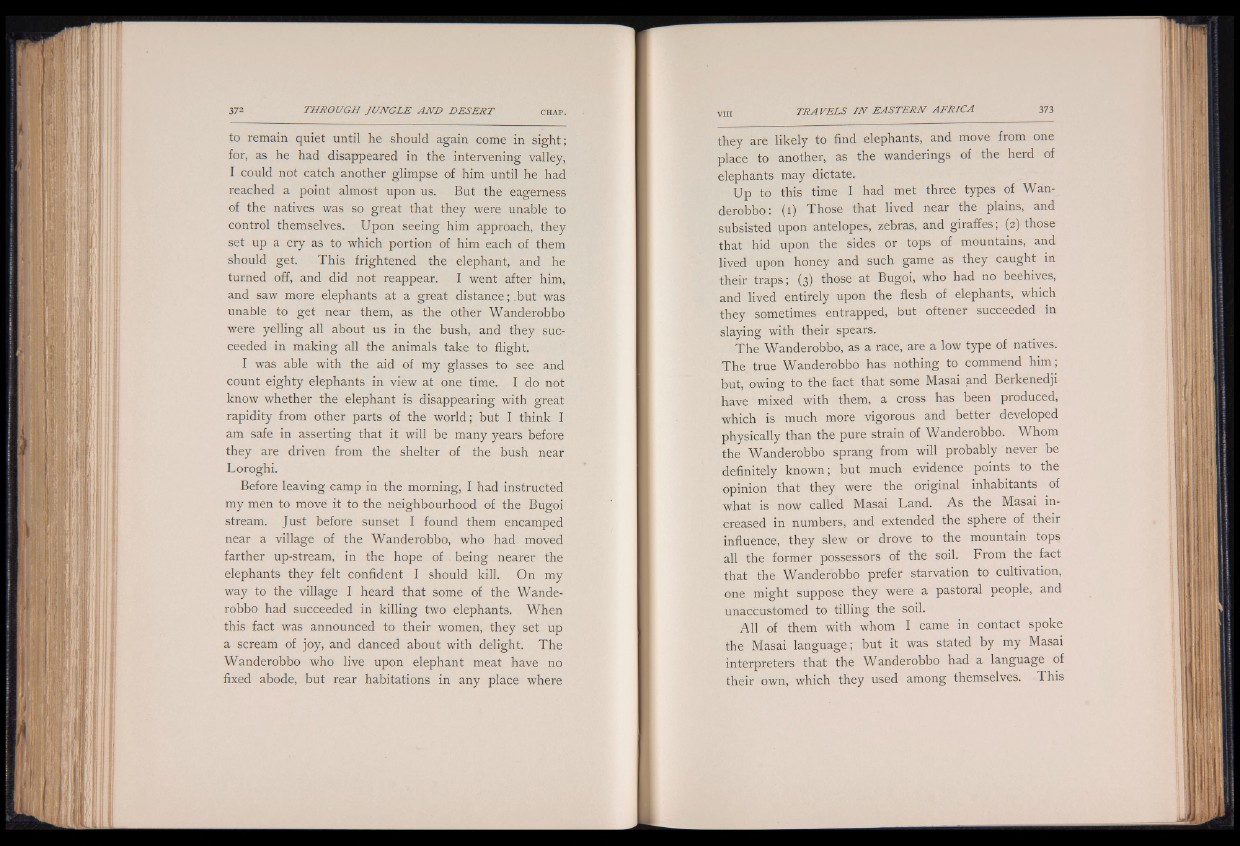
to remain quiet until he should again come in sight;
for, as he had disappeared in the intervening valley,
I could not catch another glimpse of him until he had
reached a point almost upon us. But the eagerness
of the natives was so great that they were unable to
control themselves. Upon seeing him approach, they
set up a cry as to which portion of him each of them
should get. This frightened the elephant, and he
turned off, and did not reappear. I went after him,
and saw more elephants at a great distance; .but was
unable to get near them, as the other Wanderobbo
were yelling all about us in the bush, and they succeeded
in making all the animals take to flight.
I was able with the aid of my glasses to see and
count eighty elephants in view at one time. I do not
know whether the elephant is disappearing with great
rapidity from other parts of the world; but I think I
am safe in asserting that it will be many years before
they are driven from the shelter of the bush near
Loroghi.
Before leaving camp in the morning, I had instructed
my men to move it to the neighbourhood of the Bugoi
stream. Just before sunset I found them encamped
near a village of the Wanderobbo, who had moved
farther up-stream, in the hope of being nearer the
elephants they felt confident I should kill. On my
way to the village I heard that some of the Wanderobbo
had succeeded in killing two elephants. When
this fact was announced to their women, they set up
a scream of joy, and danced about with delight. The
Wanderobbo who live upon elephant meat have no
fixed abode, but rear habitations in any place where
they are likely to find elephants, and move from one
place to another, as the wanderings of the herd of
elephants may dictate.
Up to this time I had met three types of Wan-
derobbo: (i) Those that lived near the plains, and
subsisted upon antelopes, zebras, and giraffes; (2) those
that hid upon the sides or tops of mountains, and
lived upon honey and such game as they caught in
their traps; (3) those at Bugoi, who had no beehives,
and lived entirely upon the flesh of elephants, which
they sometimes entrapped, but oftener succeeded in
slaying with their spears.
The Wanderobbo, as a race, are a low type of natives.
The true Wanderobbo has nothing to commend him;
but, owing to the fact that some Masai and Berkenedji
have mixed with them, a cross has been produced,
which is much more vigorous and better developed
physically than the pure strain of Wanderobbo. Whom
the Wanderobbo sprang from will probably never be
definitely known; but much evidence points to the
opinion that they were the original inhabitants of
what is now called Masai Land. As the Masai increased
in numbers, and extended the sphere of their
influence, they slew or drove to the mountain tops
all the former possessors of the soil. From the fact
that the Wanderobbo prefer starvation to cultivation,
one might suppose they were a pastoral people, and
unaccustomed to tilling the soil.
All of them with whom I came in contact spoke
the Masai language; but it was stated by my Masai
interpreters that the Wanderobbo had a language of
their own, which they used among themselves. This